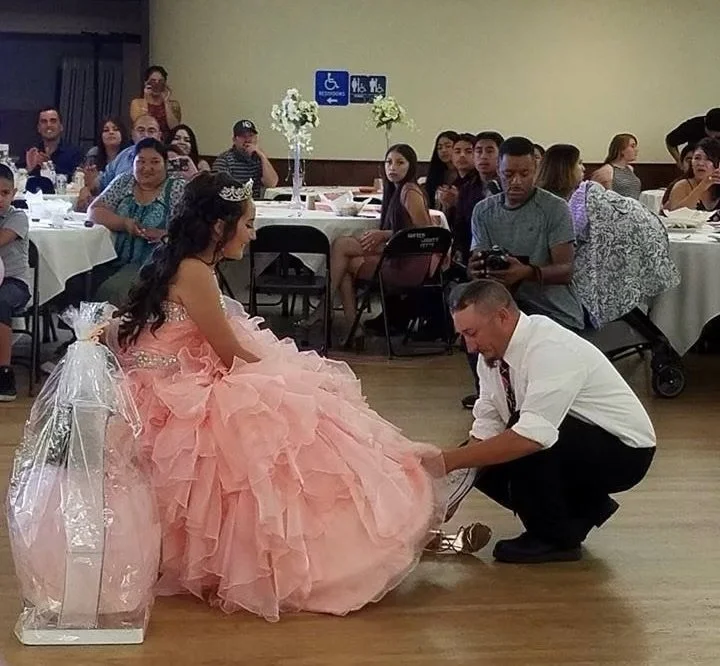Making Amends: How One Dad Did it Right
Michelle Watson
With this being the second blog in this Valentines month, I want to continue on the topic of LOVE---from a dad to his daughter. And one of the best ways you can show love to your daughter is to lead by making amends when you’ve caused her pain.
As we know, ruptures in relationships are a reality for all of us. This means that every one of shares in either being hurt or being the one to cause the hurt. Whether unintentional or intentional, when we’ve caused harm, we must develop a skill set in doing repair work in order to restore.
I can honestly say that the most common questions fathers ask or write me about are tied to estrangement. Here’s the most recent example:
I truly want to reconcile with my daughter and be a better dad, even though she has a step-dad now. I was wrong to stay away for so long and make it about me instead of about her. I’m not wanting to overstep but how do I let her know I want to be involved in her life now? I don’t want to make things worse. I appreciate your advice Dr. Michelle.
Although I often have minimal knowledge of the entirety of the situation when responding, I do want to give dads practical and proactive strategies they can put into action to invest in changing things for the better with their girls.
This leads me to a real life story, one that I had the privilege of being a part of.
Leanne is a 35-year old daughter, married, and the mother of two. She contacted me to ask if I could help navigate her relationship with her father after years of feeling the strain between them. Both were willing to peel back the layers while knowing they needed someone to help guide them through the process.
Even though Dad, Scott, saw the task ahead as somewhat daunting, perhaps unnecessary, he said that if this would help his daughter heal then he was committed to joining her for counseling. Courageously, they both opened up about the ways that Scott’s often gruff and dismissive parenting style when raising his tender-hearted daughter not only hurt her then, but was still impacting her now. She shared that she had internalized his view of her and still believes she’s “stupid and dumb,” with an overall feeing of being unworthy.
Through this process of talking and listening, Dad gave his daughter one of the best gifts she’d ever received from him.
Without being defensive, Scott listened.
For seven weeks in a row, he listened.
Far past the point where he normally would have walked away, he listened.
All out of love for his daughter.
We finally reached the place where Scott, though hesitantly, was willing to accept an assignment to write Leanne a letter. Not knowing exactly what to write (especially since his daughter is an accomplished writer, which in his mind served to highlight his inadequacy), he used a template, attached here, to guide the process.
This dad followed directions, put pen to paper (actually fingers to keyboard), and gave it his all. To say he did it right is an understatement!
Scott told Leanne how he sees her embodying the meaning of her name while telling her specific ways he is proud of her, even including unique qualities he admires about her. And he made amends. He said he was sorry for not being gentle and patient with her when she was a little girl.
Now you may be wondering: What good does it do to dredge up the past, especially when bygones are bygones? You may be thinking that it’s cruel for an adult daughter to drag her dad into a counselor’s office just so he can hear her tell him how he blew it when she was little when he was doing the best he could at the time.
You can decide for yourself whether you still hold to that position after hearing what Leanne later wrote to her dad in response to their life-changing interaction:
There was a moment when you stopped reading for a second and you glanced at me with wet eyes and tears streaming down your cheeks—I don’t even remember what part of the letter it was—that I have permanently engrained in my memory. It’s the strongest you’ve ever looked to me. I find it fascinating, and I think you might think it absurd, that my certainty of your strength was birthed from a moment where you were completely broken down. Even the little six-year-old in me is so proud of you and is saying, “My daddy is so strong!” Dad, you are one of the bravest men I know.
Even as an adult woman, Leanne still longed to hear what her daddy thought of her.
She needed to hear his words that connected her little girl questions to her adult self. And she soaked in his words---about truly understanding the ways he had hurt her, coupled with being proud of her--and why.
Leanne needed to hear him read his letter out loud to her.
She needed to hear his heartfelt emotion as he expressed himself.
Scott agreed. Something broke free in him by doing this, leading him to say: “I don’t expect myself to be perfect anymore. I’m actually more real now.”
It was in this process of opening up the conversation that both of their hearts moved towards healing. When this father asked forgiveness, his daughter immediately responded with love and grace. Each of them felt more understood as they went through this process together.
Leanne further explained:
It’s like taking two magnets and flipping them around so instead of connecting tightly, they push against each other in opposition, making it impossible for connection to happen. This letter, both the letter itself and my dad’s emotions in reading it, was the first time our magnets faced the right way for connection to happen. I literally feel like I heard words I’ve been waiting 30 years to hear.
In reflecting back on this experience, I asked Leanne to share a few highlights that stood out to her from the journey:
The problem is the wounds from hurt don’t get healed if we ignore them; I learned that not only was I wounded by the past, so was my dad. His sobs and streaming tears were physical manifestations of how deep his own wounds are. This means we have pain in common and in a weird way I feel closer to him now that I know.
So to sum up, I want to tell dads everywhere to write and read your daughter a letter because it:
1) Shows she’s worth pursuing
2) Lets her know how you feel about her
3) Allows her to see herself through your eyes, which is far more valuable and loving than how the world will communicate her worth.
My hope in sharing this real-life story with you is to demonstrate that it’s never too late for a dad to make amends with his daughter. When a dad comes without defensiveness, and is open and willing to hear her heart hurts, he gives her---and himself---the gift of freedom, release, and healing.
Thank you, Leanne and Scott, for the powerful way you’ve modeled that it’s possible for a dad and daughter to make amends if they’re both committed to doing so.
Thank you for showing us that it’s never too late to make things right. I believe I speak for us all when I say how extremely grateful we are for the gift you have given us by your courage to share your story.
I trust that every dad reading this will take their story to heart and take steps today to make amends with your daughter (and son). Don’t put it off another day.
She’s worth the hard work. And so are you.





















